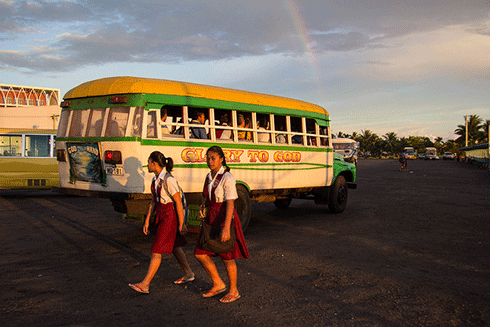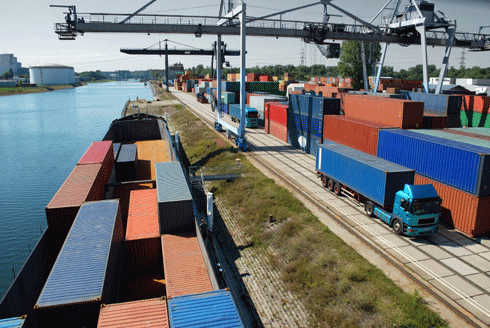
|
Published: 8 September 2014
‘Green growth’ one of nine steps to a better life for Pacific Island nations
A new United Nations report, launched prior to a recent International Conference on Small Island Developing States (SIDS) in Samoa, has called for stronger action to foster more inclusive and sustainable human development in the Pacific region.

|
|
Bussing to School in Apia, Samoa. Credit: OER Africa CC BY 2.0
|
According to the State of Human Development in the Pacific: A Report on Vulnerability and Exclusion in a time of rapid change, one in four people are now living below their national basic-needs poverty-line in Pacific Island countries. They also have limited access to essential services such as education and health services. Further, obesity, diabetes and other non-communicable diseases are on the rise throughout the region.
The report presents a picture of a changing social and economic regional landscape. Economies are shifting from traditional systems built on the exchange of products to market-led cash-based ones; young people are migrating from their villages to find jobs in cities and abroad, leaving women, the very old and the very young behind; traditional family and social protection systems are in decline; climate change is threatening agricultural production and traditional livelihoods and intensifying the impact of natural disasters.
‘Youth and women deserve particular attention,’ said Nicholas Rosellini, Deputy Director of United Nations Development Programme’s (UNDP) Regional Bureau for Asia and the Pacific.
‘Low and volatile growth has made job creation increasingly difficult. Women have lower access to employment and often work in informal sector with no labour rights, social security or welfare. For youth, the unemployment rate is 23 per cent, on average.
‘The report provides useful analysis of poverty and exclusion data and offers recommendations on how to strategically address exclusion, inequality and vulnerabilities in the Pacific,’ said Ambassador Odo Tevi, Permanent Representative of the Republic of Vanuatu to the UN.
The report’s key recommendations include:
-
Give priority to social protection: Universal cash grants to all children under five would lead to a 10 per cent reduction in the proportion of households living in poverty. Other examples include pension and care for the elderly, free medical care for pregnant women and support for people with disabilities. The report also mentions using new technology and mobile teams to bring health and other essential services to people living in rural areas and outer islands.
-
Develop a better understanding of vulnerability and exclusion through improved surveys and data-collection systems can help to inform and target policies and programmes to those most in need.
-
Promote broader access to basic education for children and youth: Adequate national budgets for school literacy and numeracy, and making public secondary education free or less costly would greatly assist low-income families.
-
Expand employment opportunities for youth and women: Creating more opportunities for technical, vocational and trade skills for youth and women and providing free or low-cost public secondary education to assist low-income families.
-
Provide adequate health services for prevention and care: Improve infant, child and maternal health by strengthening primary health care programs, improving access to emergency obstetric care and expanding immunisation programs and prevention efforts against HIV and AIDS. Concerted campaigns to promote better nutrition and physical exercise and discourage smoking and excessive alcohol consumption.
-
Target poverty reduction programs: Allocate resources and assistance directly to poor households. Better use of data from household income and expenditure surveys can help to inform and target poverty reduction initiatives.
-
Adopt a ‘green-growth’ approach to development: Green-growth policies should aim to improve productivity and promote the sustainable use of land and marine resources by the rural poor. Land and natural resource management decisions should be based on both environmental and social costs.
Source: UN Development Programme



